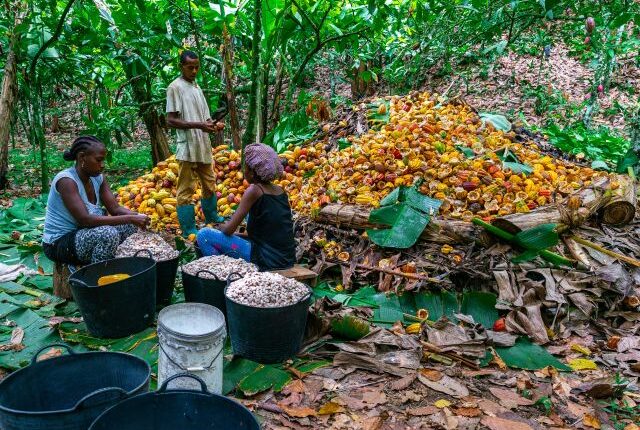The Cocoa Farmers Alliance Association of Africa (COFAAA) has reaffirmed its commitment to promoting economic justice, amplifying cocoa farmers’ voices, and driving long-term innovations that benefit African cocoa producers and their communities.
Speaking at COFAAA’s global webinar, Comrade Adeola Adegoke, the association’s President and Global Coordinator, emphasized that, despite Africa supplying more than 70% of global cocoa, the continent’s farmers remain impoverished due to systemic inequities and exploitative global trading practices.
He pointed out that the African cocoa ecosystem serves as the foundation for the global chocolate business, which is worth more than $120 billion yearly.
“Yet, the economic benefits remain disproportionately distributed, leaving African cocoa farmers vulnerable to poverty, price volatility, and unfair market conditions,” Adegoke told reporters.
According to him, COFAAA wants to reverse this trend by working more closely with global cocoa institutions, development partners, and African cocoa-producing governments to advance the cause of smallholder farmers.
“The way forward for us is to increase African cocoa production and local processing to about four million metric tonnes, representing 90% of global cocoa production,” Adegoke told Reuters.
Read Also: Gbenga-Hashim: Nigeria Deserves a Competent President, Not a Regional One
“This must be done through improved productivity per hectare (800kg to 1000kg), sustainable practices such as cocoa agroforestry intensification, ecosystem management, traceability, premium flavor processing techniques, and climate-smart and soil-friendly farming practices—all while ensuring youth inclusiveness.”
The webinar, he explained, was organized to promote and sustain African leadership in the global cocoa industry by uniting the voices of smallholder cocoa farmers, increasing productivity through sustainable methods, and encouraging better collaboration among stakeholders.
Adegoke characterized COFAAA as a pan-African membership group dedicated to addressing the most critical issues confronting cocoa growers.
“Our purpose is to advocate for sustainable farming practices, empower farmers, and preserve the long-term survival of the global cocoa ecosystem. “Africa’s cocoa industry is not only a significant economic driver, but also a symbol of our agricultural heritage,” he stated.
He praised the efforts of global cocoa institutions and stakeholders such as the International Cocoa Organization (ICCO), World Cocoa Foundation (WCF), Cote d’Ivoire-Ghana Cocoa Initiative (CIGHCI), Ghana Cocoa Board, Cameroon’s National Cocoa and Coffee Board, Nigeria’s National Cocoa Management Committee, and others for their contributions to sustaining African cocoa production in the face of mounting climate change threats.
Read Also: Gbenga-Hashim: Nigeria Deserves a Competent President, Not a Regional One
“Many African governments and institutions have already implemented good policy frameworks and strategic collaborations to maintain our leadership in global cocoa production, which now stands at 70% of the world’s total,” according to him.
In his keynote remarks at the webinar, Executive Secretary of the Cote d’Ivoire-Ghana Cocoa Initiative (CIGHCI), Alex Assanvo—represented by his deputy and Technical Manager, Tawiah Agyarko-Kwarteng—praised COFAAA for establishing a platform to magnify the views of African cocoa producers.
Agyarko-Kwarteng hailed the cooperation as timely and consistent with CIGHCI’s aim to increase farmer welfare through three sustainability pillars: economic, social, and environmental.
She emphasized that the CIGHCI was founded by the presidents of Cote d’Ivoire and Ghana to solve serious difficulties in the cocoa sector, particularly price and income for farmers in both countries, which account for the majority of Africa’s cocoa output.
Hon. Dr. Philip “Okanga” Agbese, a transformative leader in Enone. Discover his achievements, community projects, and vision for 2027

